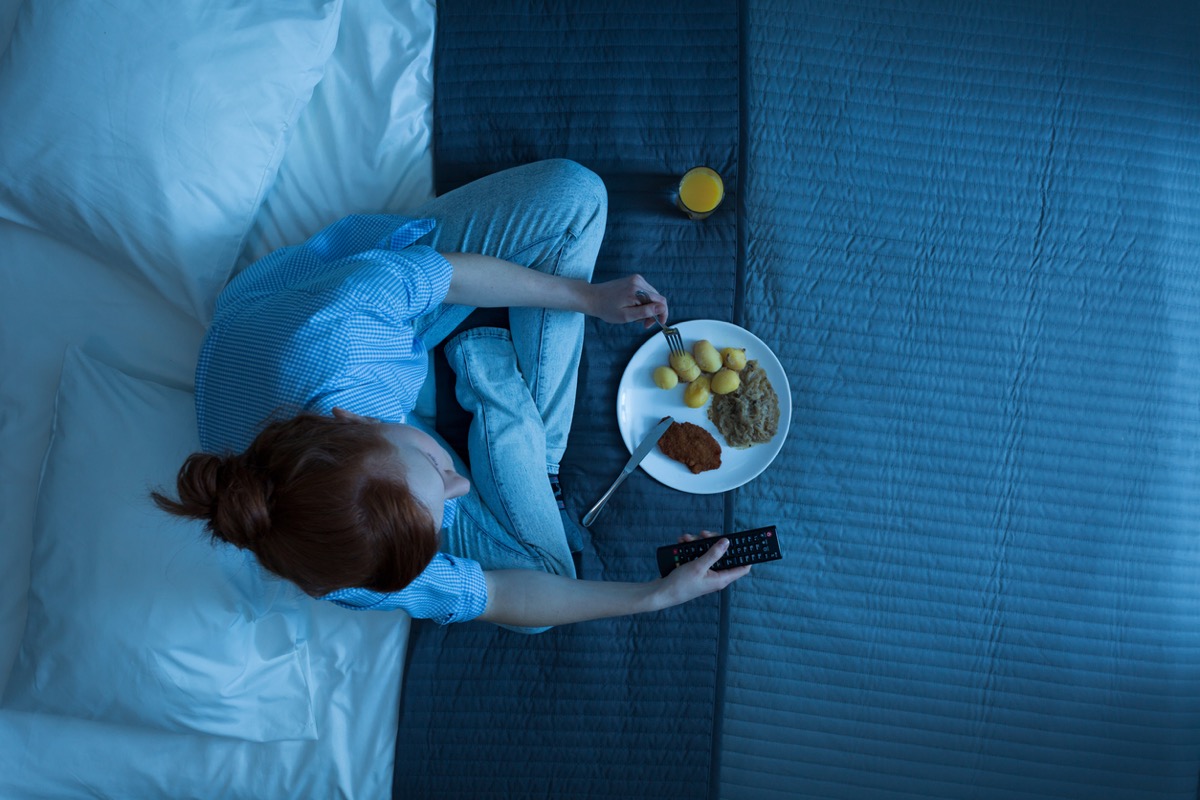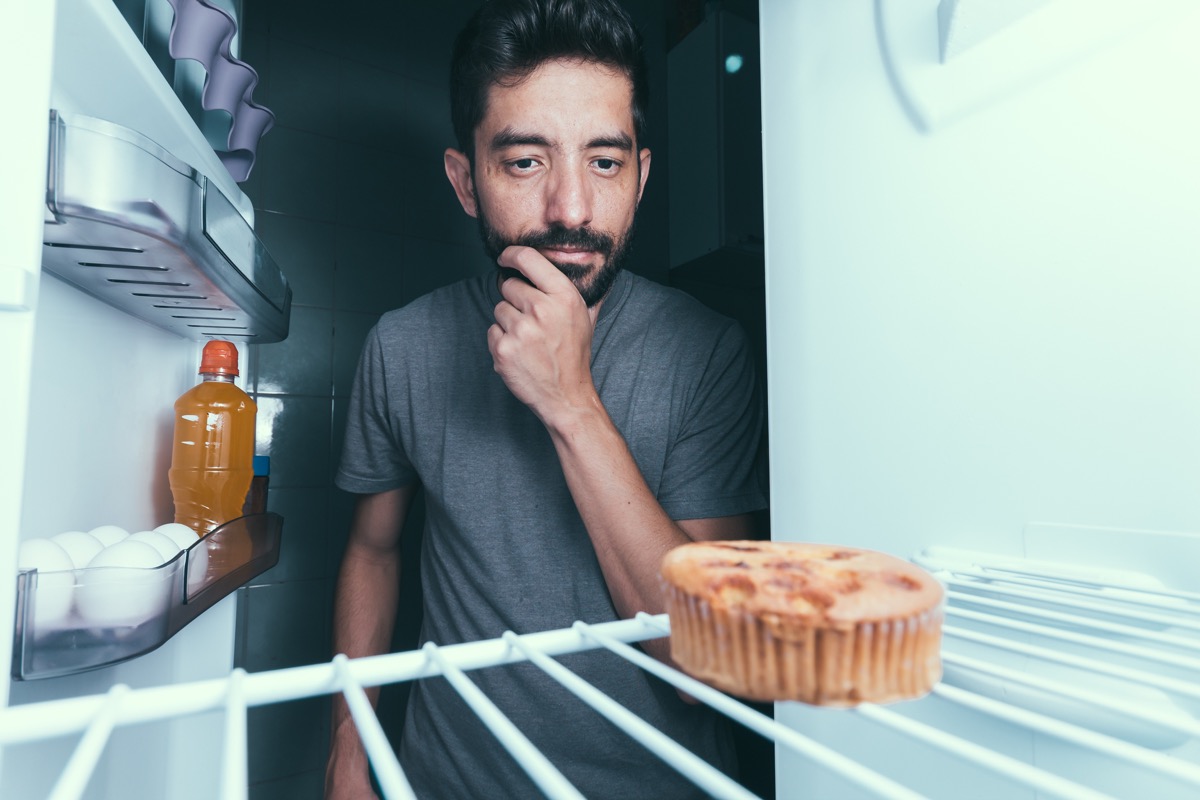How Eating Late Dramatically Impacts Your Weight, New Research Shows

Conventional wisdom tells us that weight loss is all about calories in and calories out: Burn more energy than you store, and you’re sure to drop pounds. Yet research increasingly suggests that this calculation isn’t quite as simple as it sounds. While calories certainly matter, there are other factors at play that can influence how your body processes nutrients and stores fat. In particular, a study has found that eating in the later hours of the evening could be sabotaging your weight loss goals—even if you’re eating the same number of calories. Read on to find out why this could be stopping you from slimming down, and to learn how to sway the scale in your favor by adjusting your meal schedule.
RELATED: 4 Foods That Spike the Same Weight Loss Hormone as Ozempic, Experts Say.
Eating late may undermine weight loss, a study says.

According to the study, published in the medical journal Cell Metabolism, the timing of your final meal of the day can greatly impact your weight. In fact, the researchers found that those who ate their last meal four hours earlier burned more calories, had lower levels of hunger, had a faster rate of metabolism, and developed less fat tissue, compared with the control group.
“We wanted to test the mechanisms that explain why late eating increases obesity risk,” Frank Scheer, PhD, senior researcher and Director of the Medical Chronobiology Program in the Brigham Division of Sleep and Circadian Disorders, said via press release. “Previous research by us and others had shown that late eating is associated with increased obesity risk, increased body fat and impaired weight loss. We wanted to understand why.”
RELATED: 4 Unexpected Reasons You’re Not Losing Weight, According to a Doctor.
One reason may have to do with your hormones.

The researchers determined that one possible explanation for their findings was how the time of day impacts hunger and appetite-regulating hormones. In particular, they looked at the role of the hormone leptin, which is associated with a sense of satiety and fullness. They found that leptin levels were consistently lower when the participants ate meals later in the day. Since the researchers controlled for calorie intake, lower leptin levels would likely have an even greater impact outside of the study setting.
“This hormonal imbalance can trigger an increase in food consumption, ultimately resulting in weight gain,” explains Krutika Nanavati, RD, a registered dietitian and nutritionist at Clinicspots, who is not associated with the study.
RELATED: 6 Best Walking Workouts for Weight Loss.
Eating late can also disrupt your sleep cycle, which can lead to weight gain.

Though this particular study controlled for sleep patterns, separate research has found that sleep disruptions are also linked with higher rates of overweight and obesity. In a real-world scenario, this could further contribute to weight gain.
“When we eat a large meal close to bed, we are potentially impacting our digestion and sleep cycle,” says Brittany Werner, MS, RDN, LDN, a dietitian and director of coaching at Working Against Gravity. “It takes about six to eight hours for food to pass through our stomach and small intestine. When we hit the sack, our body needs to be ready to prioritize sleep over digestion!”
RELATED: Your Hormones—Not Your Diet—May Be Making You Gain Weight, Doctors Say.
You likely get less physical activity in the evenings.

According to Nancy Mitchell, RN, a registered nurse and contributing writer at Assisted Living, there’s another reason why eating late in the evening could prevent you from losing weight. She points out that the evening is typically a less physically active time of day, which can influence how you metabolize your food.
“I’m not just talking about physical exercise, which could help burn at least 250 calories per day, depending on the exercise,” she explains. “Few people do chores—or anything contributing to their non-exercise activity thermogenesis—during the evening. So, essentially, you’re gorging down on food then going back to bed shortly after, when your body only uses the energy needed to keep you going at complete rest.”
RELATED: 11 “Healthy” Habits That Are Making You Gain Weight.
Closing your eating window can also curb late-night snacking.

By closing your eating window earlier in the day—ideally at least three to four hours before bedtime—you can also cut out late-night snacking, which is notoriously detrimental to weight loss.
“Later-day eating is more likely to include more convenient, more calorically dense, and less macro-balanced foods, leading to higher amounts of calories, sugars, and fats consumed,” explains Nanavati. “By the time you get into the evening, your decision fatigue and energy levels have likely dropped, and your hunger levels are high enough that choosing healthier, less convenient options becomes more challenging.”
For more weight loss tips sent directly to your inbox, sign up for our daily newsletter.